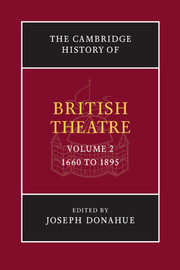Book contents
- Frontmatter
- Part I 1660 to 1800
- 1 Introduction: the theatre from 1660 to 1800
- 2 Theatres and repertory
- 3 Theatre and the female presence
- 4 Theatre, politics and morality
- 5 Theatre companies and regulation
- 6 The Beggar’s Opera A case study
- 7 Garrick at Drury Lane, 1747–1776
- 8 Theatre outside London, 1660–1775
- 9 1776 A critical year in perspective
- 10 The theatrical revolution, 1776–1843
- Part II 1800 to 1895
- Bibliography
- Index
- References
6 - The Beggar’s Opera A case study
from Part I - 1660 to 1800
Published online by Cambridge University Press: 28 March 2008
- Frontmatter
- Part I 1660 to 1800
- 1 Introduction: the theatre from 1660 to 1800
- 2 Theatres and repertory
- 3 Theatre and the female presence
- 4 Theatre, politics and morality
- 5 Theatre companies and regulation
- 6 The Beggar’s Opera A case study
- 7 Garrick at Drury Lane, 1747–1776
- 8 Theatre outside London, 1660–1775
- 9 1776 A critical year in perspective
- 10 The theatrical revolution, 1776–1843
- Part II 1800 to 1895
- Bibliography
- Index
- References
Summary
Why a ‘case study’ of The Beggar’s Opera? Because, first, the Opera’s astonishing opening run makes it a candidate for special attention in any historical account. Nothing like it, so far as the records demonstrate, had ever been seen on the London stage before then (nor seen there again, for a long time): thirty-two consecutive performances and a total run of sixty-two performances for the season, after the opening on 29 January 1728 at John Rich’s theatre in Lincoln’s Inn Fields (hereafter LIF).
As A. H. Scouten has noted, ‘Heretofore, a run of nine nights had been considered excellent, one of twelve nights unusual’. But sixty-two? A perception that something important was happening was almost immediate. By the third of February – in the first week of the run – the opposition newspaper the Craftsman gave first voice to the witticism that has become standard: the Opera ‘has met with a general Applause, insomuch that the Waggs say it has made Rich very Gay, and probably will make Gay very Rich’. And so it turned out, with Gay transformed virtually overnight from an impoverished poet making do by living with his wealthy friends to the most prosperous dramatist of his time, and the saturnine Rich becoming, if not gay (i.e., merry), at least tranquil. In May 1728 the first imitation of The Beggar’s Opera appeared at the Little Haymarket Theatre, Thomas Cooke and John Mottley’s ballad opera Penelope – the Odyssey story set in Queen Anne’s England – but ran only three nights. Gay’s Opera continued serenely on at LIF through its sixty-second performance on 19 June.
- Type
- Chapter
- Information
- The Cambridge History of British Theatre , pp. 126 - 144Publisher: Cambridge University PressPrint publication year: 2004

